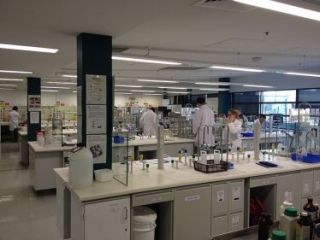Oct 9 2015
A catalyst is a substance—usually a metal or an oxide—that facilitates or allows a chemical reaction, but is neither consumed nor altered by the reaction itself. Crucial to the reaction’s success, a catalyst is like the car engine enabling an uphill drive.
 A chemistry lab. Photo credit: Ozarch.
A chemistry lab. Photo credit: Ozarch.
A new center at the University of California, Riverside has now received formal approval from the Office of Research and Economic Development on campus to focus on catalysis. The UCR Center for Catalysis brings together expertise in catalysis and nanotechnology already available at UCR to address the large and complex challenges facing the field in the 21st century.
“There are many non-catalytic processes that could benefit from the incorporation of new catalysts,” said Francisco Zaera, a distinguished professor of chemistry and the director of the new center. “The challenge is to carry out complex reactions with the use of catalysts in a selective way, so only the desirable product is made, without any undesirable byproducts from side reactions. This requires a level of sophistication in catalyst design that has not been available in the past.”
Zaera explained that the recent advent of new nanotechnologies has dramatically changed this perspective. These technologies are able to synthesize complex solids with well-defined characteristics, and have already found applications in catalysis.
“This way of making catalysts promises to revolutionize the field,” he said. “UCR is uniquely placed to take on the challenge of incorporating nanotechnologies to the design of more selective catalysts. We already have a critical mass of scientists working on different aspects of this problem.”
A variety of research projects will be carried out at the new center involving UCR faculty members as well as collaborators from other institutions in academia, national laboratories, and industry, both in the United States and abroad.
Research at the center will provide valuable experience for undergraduate and graduate students, postdoctoral fellows, and visiting researchers, who will work on interdisciplinary projects, interact with multiple research groups, and gain wide exposure to a variety of scientific skills, including the synthesis and characterization of complex molecular and solid catalysts and the use of novel nanotechnologies. “We will also aim to promote educational and outreach activities—for example, seminars, informal scientific gatherings, visits to high schools and colleges—and develop on-line educational and informational materials,” Zaera said.
Chemical catalysis affects our everyday life in many ways. By some accounts, catalysis contributes to approximately 35 percent of the world’s gross domestic product. More than 90 percent of all chemical manufacturing is based or relies heavily on catalytic processes. Catalytic reactions are at the heart of making most chemicals and materials, including some of the polymers and composites found in many modern products. They also play a central role in energy applications, pollution control, biological and medical applications, and food production.
“Even though the first catalytic reactions were identified more than a century ago, much still remains to be done in this field,” Zaera said. “Our center will emphasize addressing catalytic needs in several areas of current importance in society, including problems in energy storage and generation, environmental remediation, green chemistry and the synthesis of pharmaceuticals.”
Initial funding of $100,000 in 2014 and $75,000 this year was provided by the Office of Research and Economic Development for the creation of this center and the initiation of the first collaborative projects.
“Currently, we are exploring additional venues of extramural and industrial financial support,” Zaera said.